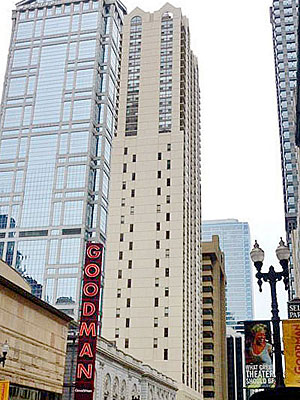
Photo: Dennis Rodkin
200 North Dearborn
Last month, I reported on the large number of all-cash home purchases and gave a few examples. Now there’s data from DePaul’s Institute for Housing Studies that details where the cash buyers are—or at least, where they were in 2012.
In Cook County last year, there were three key clusters of non-distressed homes that went for cash. (Distressed homes, typically those that are in foreclosure, often sell to investors for cash and are scattered all over the city and suburbs; this story is about cash sales of homes that aren’t in distress. For the rest of this article, “cash” means “cash, non-distressed.”)
The three groupings have very different causes. But first, here’s where they are:
• In Englewood, 87 percent of the home purchases in one census tract (#6802 on this map) in 2012 were cash. That’s nearly four times the proportion for the city overall: IHS found that 23.2% of all sales in the city were cash (that’s cash non-distressed, remember).
• In the Loop’s census tract 3202, 65 percent of the homes sold in 2012 were cash.
• Going by the number, not the percentage, of sales, the Near North Side had by far the most: 459 homes were cash sales in six census tracts in the Gold Coast and Streeterville. (They’re tracts 810–815.) It’s 48 percent of the total sales—a hefty two times the city average, even though I did say that this one is about raw numbers.
Okay, why these places? IHS’s Sarah Duda and Tina Fassett dug into the data and found that each one has a different reason.
• The great majority of the Englewood cash buys—37 of 41 homes—were made by Norfolk Southern Corp as part of the expansion of its 47th Street intermodal freight facility. It’s a massive project that’s projected to bring nearly 400 new jobs to the area, although opponents argue that it’s gobbling up a chunk of the neighborhood.
According to Norfolk Southern spokesman Robin Chapman, the 37 purchases that IHS found in 2012 land records have been followed by another 25 in 2013, with 59 more still to be purchased—121 privately-owned lots in all. The company is also buying 105 parcels from the city. The private sales are done in cash, Chapman said, because “the real estate purchase is part of the budget for the project. We wouldn’t need to finance it.”
• All 95 sales in the 3202 census tract, in the northwest part of the Loop, 72 were in one building: 200 N. Dearborn, a late 1980s apartment tower converted to 309 condos in 2007. There are few other for-sale residential properties in the census tract, but more to the point on the high number of cash purchases is this: buyers who pay cash get a ten-percent discount.
Sales officials at the building haven’t responded to requests for comment.
• On the Near North Side, the reason for so many cash purchases is that wealthy people have cash and, according to two agents who work there, renewed confidence in the real estate market.
“Empty nesters who are selling their big suburban home and downsizing into something more efficient in the city don’t want to have overhead or a lot of monthly expenses, so they pay cash,” says Coldwell Banker agent Jennifer Ames. The cash may come from the proceeds of selling their prior home or from other assets, she says.
A few years ago, when the economy looked bleaker, Ames says, more of those buyers would have financed their purchases in order to keep cash liquid. “But as the economy has improved, people have felt secure plunking down cash.”
@Properties’ Tricia Fox concurs: “The perception in the luxury market is that with stocks going up and down, real estate is a good place to put cash,” she says.
Some affluent buyers use cash because they’re buying in one of the few Gold Coast co-op buildings that still require it, Ames notes. Others might be trying to avoid appraisal issues. With prices rising quickly in the past year—according to Case-Shiller data out Tuesday, Chicago’s home prices were up 3.3 percent from May to June, the second-biggest increase among major cities—appraised values don’t always keep up with the market. A buyer who wants a property for more than the appraiser tells the lender it’s worth may opt to go with cash instead, Fox explains.
She and Ames both say they expect the number of cash sales for 2013 to come in higher than in 2012.


